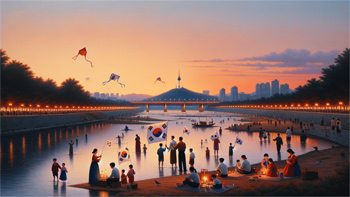 Liberation Day in South Korea
Liberation Day in South Korea


Liberation Day in South Korea, known as 'Gwangbokjeol', is celebrated with deep national pride and a sense of historical significance. Observed annually on August 15th, this day commemorates Korea's liberation from Japanese colonial rule in 1945. It's a day that marks not just the end of oppression but also the beginning of a new era of freedom and sovereignty for the Korean Peninsula. In this exploration, we will delve into the historical context of Liberation Day, how it's celebrated, and its ongoing significance in modern South Korean society.
The history of Liberation Day dates back to the end of World War II, when Korea was liberated from Japanese colonial rule, which had lasted from 1910 to 1945. This liberation was a pivotal moment for the Korean people, as it signified the end of decades of hardship and the start of a journey towards independence and self-governance.
National Celebrations and Commemorative Events
Liberation Day is marked by various national celebrations and commemorative events across South Korea. The main event is the official ceremony held in the capital city, Seoul, attended by the President and other high-ranking officials. This ceremony includes the singing of the national anthem, the raising of the South Korean flag, and speeches that reflect on the historical importance of the day.
Throughout the country, local governments and organizations also hold various events, such as parades, concerts, and cultural performances. These events are designed to celebrate the spirit of freedom and to honor the sacrifices made for the nation's independence.
Reflection and Education
Liberation Day also serves as a day of reflection and education. It's an opportunity to educate younger generations about the country's past struggles and to instill a sense of national pride and responsibility. Schools and educational institutions often organize history lessons, exhibitions, and activities focused on the significance of Korea's liberation.
Media outlets play a significant role in this educational effort by airing documentaries, films, and special programs that tell the stories of the liberation struggle. These media presentations help to keep the memories of the past alive and relevant for contemporary audiences.
Public Participation and Unity
Public participation is a key aspect of Liberation Day. South Koreans of all ages take part in the celebrations, with many wearing traditional clothing, such as the 'hanbok', as a symbol of national pride. The day also sees numerous volunteer activities and community service projects, emphasizing unity and civic responsibility.
Liberation Day is not only a time for joyous celebration but also for solemn remembrance of the past. It's a day to honor those who fought for Korea's freedom and to reflect on the importance of maintaining peace and unity on the Korean Peninsula.
In modern South Korea, Liberation Day remains a highly significant national holiday. It's a symbol of the country's resilience, its journey towards democracy, and its ongoing commitment to peace and prosperity. As South Korea continues to play a significant role on the global stage, Liberation Day stands as a reminder of its historical struggles and triumphs, inspiring a sense of hope and determination for the future.